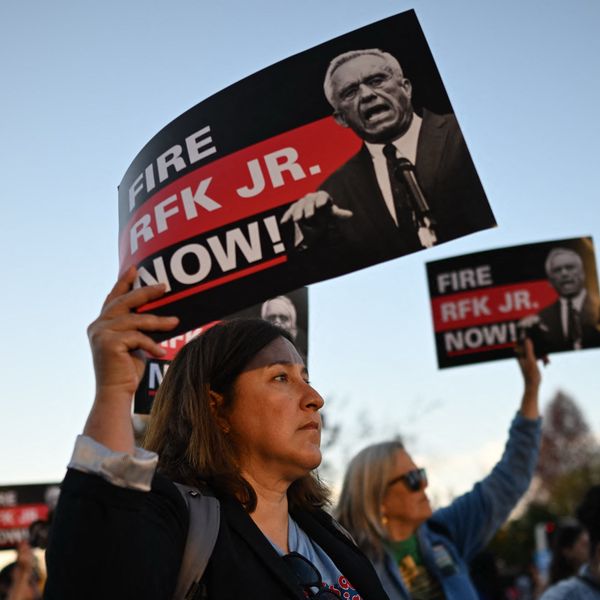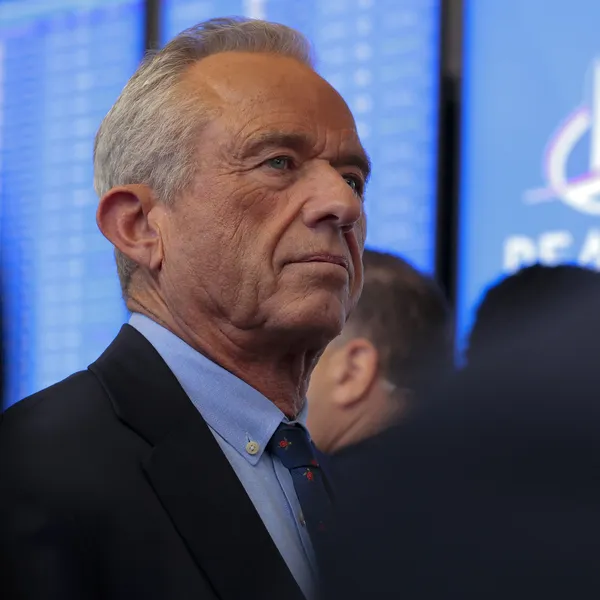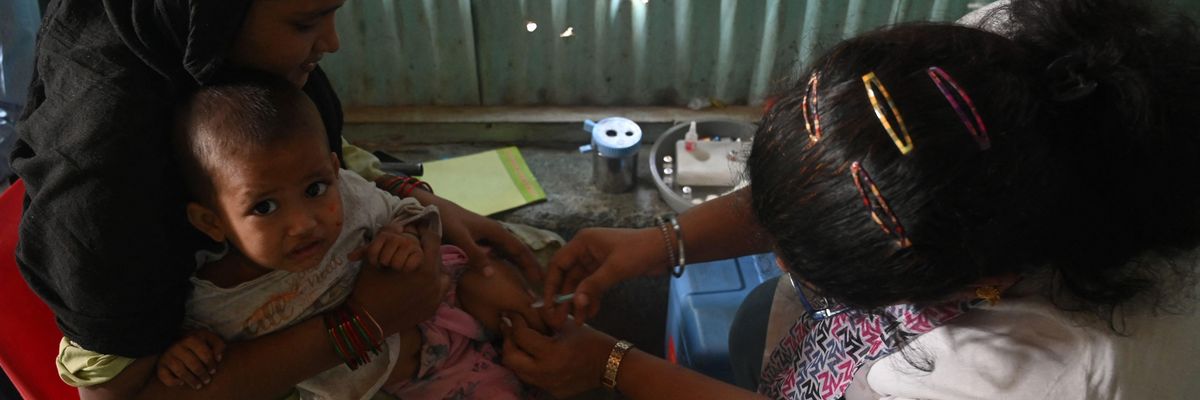The World Health Organization and the U.S. Centers for Disease Control and Prevention warned Wednesday that tens of millions of children around the globe are "dangerously susceptible" to measles infection as vaccination against the deadly but preventable disease has steadily declined since the start of the Covid-19 pandemic.
"Behind every statistic in this report is a child at risk of a preventable disease."
In addition to coronavirus-related diversions of resources and disruptions to routine medical care, some public health experts are attributing the worsening measles threat to the intensified spread of anti-vaccine disinformation, led by right-wing science deniers from the United States.
A record high of almost 40 million children worldwide missed a measles vaccine dose in 2021, says a joint report from the WHO and the CDC. A whopping 25 million kids missed their first dose and another 14.7 million missed their second dose in what the agencies called "a significant setback in global progress towards achieving and maintaining measles elimination."
Globally, there were an estimated nine million cases and 128,000 deaths from measles in 2021, up from 7.5 million cases and 60,700 deaths in 2020. Nearly two dozen countries endured "large and disruptive outbreaks" last year, according to the WHO and the CDC.
"Declines in vaccine coverage, weakened measles surveillance, and continued interruptions and delays in immunization activities due to Covid-19, as well as persistent large outbreaks in 2022, mean that measles is an imminent threat in every region of the world," the agencies warned.
In the words of WHO Director-General Tedros Adhanom Ghebreyesus, "The paradox of the pandemic is that while vaccines against Covid-19 were developed in record time and deployed in the largest vaccination campaign in history, routine immunization programs were badly disrupted, and millions of kids missed out on lifesaving vaccinations against deadly diseases like measles."
As Tedros has long lamented, millions of children and adults in low-income nations have also been denied access to Covid-19 vaccines and treatments as a result of dose hoarding by rich countries and knowledge hoarding by Big Pharma--an ongoing injustice that has prolonged the pandemic and its damaging side effects.
"Getting immunization programs back on track is absolutely critical," said Tedros. "Behind every statistic in this report is a child at risk of a preventable disease."
The WHO and the CDC called the situation "grave." As the agencies explained:
Measles is one of the most contagious human viruses but is almost entirely preventable through vaccination. Coverage of 95% or greater of two doses of measles-containing vaccine is needed to create herd immunity in order to protect communities and achieve and maintain measles elimination. The world is well under that, with only 81% of children receiving their first measles-containing vaccine dose, and only 71% of children receiving their second measles-containing vaccine dose. These are the lowest global coverage rates of the first dose of measles vaccination since 2008, although coverage varies by country.
Stressing the need for "urgent global action," the report states: "Measles anywhere is a threat everywhere, as the virus can quickly spread to multiple communities and across international borders. No WHO region has achieved and sustained measles elimination. Since 2016, 10 countries that had previously eliminated measles experienced outbreaks and reestablished transmission."
It continues:
In 2021, nearly 61 million measles vaccine doses were postponed or missed due to Covid-19-related delays in immunization campaigns in 18 countries. Delays increase the risk of measles outbreaks, so the time for public health officials to accelerate vaccination efforts and strengthen surveillance is now. CDC and WHO urge coordinated and collaborative action from all partners at global, regional, national, and local levels to prioritize efforts to find and immunize all unprotected children, including those who were missed during the last two years.
"For three years, we have been sounding the alarm about the declining rates of vaccination and the increasing risk to children's health globally," said UNICEF immunization chief Ephrem Tekle Lemango. "Widening gaps in immunization coverage are letting measles--the most contagious yet vaccine-preventable killer disease--spread and cause illness and death."
"We have a short window of opportunity," Lemango added, "to urgently make up for lost ground in measles vaccination and protect every child."
CDC Director Rochelle Walensky, for her part, said that "the record number of children under-immunized and susceptible to measles shows the profound damage immunization systems have sustained during the Covid-19 pandemic."
"Measles outbreaks illustrate weaknesses in immunization programs," Walensky noted, "but public health officials can use outbreak response to identify communities at risk, understand causes of under-vaccination, and help deliver locally tailored solutions to ensure vaccinations are available to all."
When it comes to understanding the causes of declining measles vaccination rates, Peter Hotez, a professor of pediatrics at the Baylor College of Medicine and leader of the Texas Children's Hospital team applauded for developing a patent-free Covid-19 jab, argued that "rising anti-vaccine activism" must be considered a key factor alongside pandemic-driven social disruptions and reallocations of resources.
In a paper published earlier this year in the peer-reviewed journal Nature Reviews Immunology, Hotez wrote: "In the time of the Covid-19 pandemic, anti-vaccine activism in the USA accelerated, amplified, and formed an alliance with political groups and even extremists. An organized, well-funded, and empowered anti-science movement now threatens to spill over and threaten all childhood immunizations in the USA and globally."
According to Hotez:
A central concern is whether anti-vaccine activism from the USA will detrimentally effect the world's low- and middle-income countries (LMICs). For two decades, under the auspices of the 'Global Goals' (initially the 'Millennium Development Goals' followed by 'Sustainable Development Goals'), tremendous strides have been made in reducing deaths and morbidity from measles, polio, pertussis, and other dangerous illnesses that can be prevented by vaccination. The fear is that globalizing anti-vaccine activism might reverse these trends. A successful vaccine ecosystem led by Gavi, the Vaccine Alliance, and its United Nations partners, the World Health Organization (WHO) and UNICEF, is under threat.
Even before the emergence of Covid-19, the WHO listed vaccine hesitancy as one of the top 10 global health threats, including in LMICs. Now, in this time of the pandemic, the WHO notes further significant 'backsliding' of routine childhood immunizations.
"Anti-vaccine activism now costs human lives on scales that exceed global terrorism or other established threats," Hotez concluded. "We must recognize the depth and breadth of anti-vaccine activism and its detriment to global security."
A pair of studies from 2019 revealed that getting infected with measles is even more dangerous than scientists previously believed, underscoring the importance of vaccination.
Summarizing the research when it was published, The Washington Post reported: "In addition to the illness caused by the virus, a measles infection also takes a wrecking ball to the immune system. It destroys up to half of the existing antibodies that protect against other viruses and bacteria... That means people, especially children, who get measles become much more vulnerable to other germs that cause diseases such as pneumonia and influenza that they had previously been protected against."
"Measles is not a harmless illness, as some anti-vaccine activists falsely claim, but one with deadly consequences," the newspaper noted. While many people in the U.S., including doctors, "have never seen the consequences of the disease because it became so rare thanks to vaccination," the country nearly lost its measles elimination status in 2019 when outbreaks among unvaccinated populations in New York City led to more than 1,200 infections--the most since 1992. More than 50 cases have been detected nationwide so far this year.
Measles remains a life-threatening scourge around the world, especially for unvaccinated young children in low-income countries.
"Plummeting measles vaccination rates should set off every alarm," Elizabeth Cousens, president of the United Nations Foundation, said Wednesday. "Tens of millions of children are at risk of this deadly yet entirely preventable disease until we get global vaccination efforts back on track."
"There is no time to waste," she added. "We must work urgently to ensure lifesaving vaccines reach every last child."



